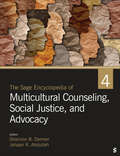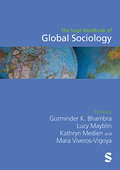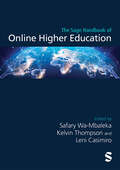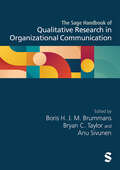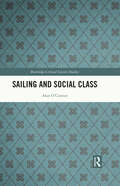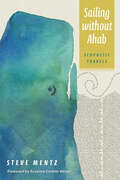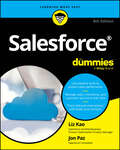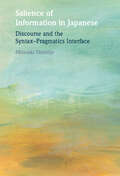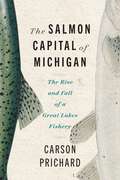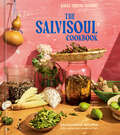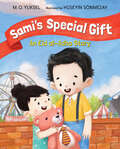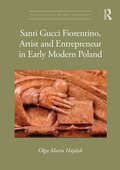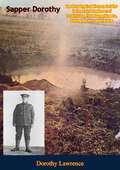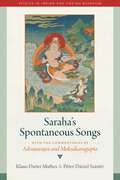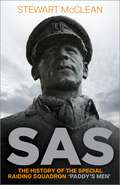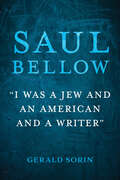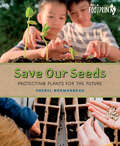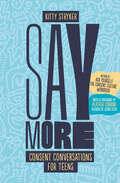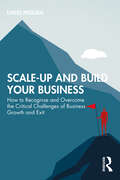- Table View
- List View
The Sage Encyclopedia of Multicultural Counseling, Social Justice, and Advocacy
by Shannon B. Dermer Jahaan R. AbdullahSince the late 1970s, there has been an increase in the study of diversity, inclusion, race, and ethnicity within the field of counseling. The SAGE Encyclopedia of Multicultural Counseling, Social Justice, and Advocacy will comprehensively synthesize a wide range of terms, concepts, ideologies, groups, and organizations through a diverse lens. This encyclopedia will include entries on a wide range of topics relative to multicultural counseling, social justice and advocacy, and the experiences of diverse groups. The encyclopedia will consist of approximately 600 signed entries, arranged alphabetically within four volumes.
The Sage Encyclopedia of Multicultural Counseling, Social Justice, and Advocacy
by Shannon B. Dermer Jahaan R. AbdullahSince the late 1970s, there has been an increase in the study of diversity, inclusion, race, and ethnicity within the field of counseling. The SAGE Encyclopedia of Multicultural Counseling, Social Justice, and Advocacy will comprehensively synthesize a wide range of terms, concepts, ideologies, groups, and organizations through a diverse lens. This encyclopedia will include entries on a wide range of topics relative to multicultural counseling, social justice and advocacy, and the experiences of diverse groups. The encyclopedia will consist of approximately 600 signed entries, arranged alphabetically within four volumes.
The Sage Handbook of Global Sociology
by Gurminder K. Bhambra Lucy Mayblin Kathryn Medien Mara Viveros-VigoyaThe SAGE Handbook of Global Sociology addresses the ‘social’, its various expressions globally, and the ways in which such understandings enable us to understand and account for global structures and processes. It demonstrates the vitality of thought from around the world by connecting theories and traditions, including reflections on European colonization, to build shared, rather than universal, understandings. Across 36 chapters, the Handbook offers a series of perspectives and cases from different locations, enabling the reader better to understand the particularities of specific contexts and how they are connected to global movements and structures. By moving beyond standard accounts of sociology and social theory, this Handbook offers both valuable insight into and scholarly contribution to the field of global sociology. Part 1: Politics Part 2: Labour Part 3: Kinship Part 4: Belief Part 5: Technology Part 6: Ecology
The Sage Handbook of Global Sociology
by Gurminder K. Bhambra Lucy Mayblin Kathryn Medien Mara Viveros-VigoyaThe SAGE Handbook of Global Sociology addresses the ‘social’, its various expressions globally, and the ways in which such understandings enable us to understand and account for global structures and processes. It demonstrates the vitality of thought from around the world by connecting theories and traditions, including reflections on European colonization, to build shared, rather than universal, understandings. Across 36 chapters, the Handbook offers a series of perspectives and cases from different locations, enabling the reader better to understand the particularities of specific contexts and how they are connected to global movements and structures. By moving beyond standard accounts of sociology and social theory, this Handbook offers both valuable insight into and scholarly contribution to the field of global sociology. Part 1: Politics Part 2: Labour Part 3: Kinship Part 4: Belief Part 5: Technology Part 6: Ecology
The Sage Handbook of Online Higher Education
by Safary Wa-Mbaleka Kelvin Thompson Leni CasimiroThe SAGE Handbook of Online Higher Education presents a cutting-edge collection of 50 essays that explores the rapidly evolving landscape of online teaching and learning in higher education. Assembled and contributed by a team of leading experts, the Handbook adopts a uniquely holistic approach to examining the needs of online education. Chapters bring together voices from diverse and international backgrounds to provide insights applicable to a broad range of contexts, and present practical strategies for planning, delivering quality online higher education. The handbook covers a wide range of topics, including online pedagogy, instructional design, student engagement, technological innovation, assessment, leadership, and the developing role of online education in the context of broader societal and cultural shifts. The SAGE Handbook of Online Higher Education is an essential resource for educators, researchers, policymakers, and practitioners who seek to understand and shape the future of higher education in the digital age. Section 1: Fundamentals of Online Education Section 2: Online Education Around the World Section 3: Online Instructional Design Section 4: Online Instructional Delivery Section 5: Instructional Technology for Online Education Section 6: Online Education Administration and Management Section 7: Student Support Services
The Sage Handbook of Online Higher Education
by Safary Wa-Mbaleka Kelvin Thompson Leni CasimiroThe SAGE Handbook of Online Higher Education presents a cutting-edge collection of 50 essays that explores the rapidly evolving landscape of online teaching and learning in higher education. Assembled and contributed by a team of leading experts, the Handbook adopts a uniquely holistic approach to examining the needs of online education. Chapters bring together voices from diverse and international backgrounds to provide insights applicable to a broad range of contexts, and present practical strategies for planning, delivering quality online higher education. The handbook covers a wide range of topics, including online pedagogy, instructional design, student engagement, technological innovation, assessment, leadership, and the developing role of online education in the context of broader societal and cultural shifts. The SAGE Handbook of Online Higher Education is an essential resource for educators, researchers, policymakers, and practitioners who seek to understand and shape the future of higher education in the digital age. Section 1: Fundamentals of Online Education Section 2: Online Education Around the World Section 3: Online Instructional Design Section 4: Online Instructional Delivery Section 5: Instructional Technology for Online Education Section 6: Online Education Administration and Management Section 7: Student Support Services
The Sage Handbook of Qualitative Research in Organizational Communication
by Boris H. J. M. Brummans Bryan C. Taylor Anu SivunenThe Sage Handbook of Qualitative Research in Organizational Communication is a state-of-the-art resource for scholars, students, and practitioners seeking to deepen their understanding and expertise in this dynamic field. Written by a global team of established and emerging experts, this Handbook provides a comprehensive exploration of the field’s foundational traditions of epistemology and theory, as well as its latest methodologies, methods, issues, and debates. The volume reflects a diverse range of approaches (e.g., mixed-methods, ethnographic, rhetorical, pragmatist, phenomenological, feminist, critical race, postcolonial, queer, and engaged), and covers a broad spectrum of topics ranging from data collection and analysis, to representation. Additionally, this Handbook addresses emerging trends such as digital forensics, post-qualitative research, and the transformative impact of COVID-19 on the conduct of qualitative research in organizational communication. As the first volume of its kind in this field, The Sage Handbook of Qualitative Research in Organizational Communication is a cornerstone text for scholars, students, and practitioners interested in understanding the vital role of communication in organizational life. Part 1: Approaches to Qualitative Organizational Communication Research Part 2: Data Collection in Qualitative Organizational Communication Research: Methods and Issues Part 3: Data Analysis and Representation in Qualitative Organizational Communication Research: Methods and Issues Part 4: The Future of Qualitative Organizational Communication Research
The Sage Handbook of Qualitative Research in Organizational Communication
by Boris H. J. M. Brummans Bryan C. Taylor Anu SivunenThe Sage Handbook of Qualitative Research in Organizational Communication is a state-of-the-art resource for scholars, students, and practitioners seeking to deepen their understanding and expertise in this dynamic field. Written by a global team of established and emerging experts, this Handbook provides a comprehensive exploration of the field’s foundational traditions of epistemology and theory, as well as its latest methodologies, methods, issues, and debates. The volume reflects a diverse range of approaches (e.g., mixed-methods, ethnographic, rhetorical, pragmatist, phenomenological, feminist, critical race, postcolonial, queer, and engaged), and covers a broad spectrum of topics ranging from data collection and analysis, to representation. Additionally, this Handbook addresses emerging trends such as digital forensics, post-qualitative research, and the transformative impact of COVID-19 on the conduct of qualitative research in organizational communication. As the first volume of its kind in this field, The Sage Handbook of Qualitative Research in Organizational Communication is a cornerstone text for scholars, students, and practitioners interested in understanding the vital role of communication in organizational life. Part 1: Approaches to Qualitative Organizational Communication Research Part 2: Data Collection in Qualitative Organizational Communication Research: Methods and Issues Part 3: Data Analysis and Representation in Qualitative Organizational Communication Research: Methods and Issues Part 4: The Future of Qualitative Organizational Communication Research
Sailing and Social Class (Routledge Critical Leisure Studies)
by Alan O'ConnorThis book explores the sociology of sailing and yachting. Drawing on original research, and employing a theoretical framework based on the work of Pierre Bourdieu, the book argues that sailing is, still, an upper-middle-class activity that has much to tell us about the wider sociology of leisure and sport. The book examines the historical foundations of blue-water sailing as established by naval and colonial shipping, to trace the roots of contemporary sailing and yachting culture. It also examines archives of sailing narratives and cruising guides, as well as the children’s books of Arthur Ransome, arguing that this archival material offers a social rather than a psychological interpretation of the ‘bodily investment’ in sailing. The book uses Bourdieu’s concepts of ‘illusio’ – an investment of time, emotion and body into a worthwhile activity – and ‘habitus’, or lifeworld, alongside contemporary data sets, to examine the yacht club as a social institution, including why many boats never go out on the water, the relationship between yacht clubs and the state, and social issues as manifested in yacht clubs, such as sexism, racism and homophobia. Offering a vigorous sociological critique of yachting and sailing, this book is fascinating reading for anybody with an interest in the sociology of leisure and sport, subcultures, social theory, or social issues in wider society.
Sailing without Ahab: Ecopoetic Travels
by Steve MentzJourney through uncharted literary waters and explore Melville’s epic in bold new lightCome sail with I.We’re not taking the same trip, though you might recognize the familiar course. This time, the Pequod’s American voyage steers its course across the curvature of the Word Ocean without anyone at the helm. We are leaving one man and his madness on shore. Our ship overflows with glorious plurality—multiracial, visionary, queer, conflicted, polyphonic, playful, violent. But on this voyage something is different. Today we sail headless without any Captain. Instead of binding ourselves to the dismasted tyrant’s rage, the ship’s crew seeks only what we will find: currents teeming with life, a blue-watered alien globe, toothy cetacean smiles from vasty deeps. Treasures await those who sail without.This cycle of one hundred thirty-eight poems—one for each chapter in Moby-Dick, plus the Etymology, Extracts, and Epilogue—launches into oceanic chaos without the stabilizing mad focus of the Nantucket captain. Guided by waywardness and curiosity, these poems seek an alien ecopoetics of marine depths, the refraction of light, the taste of salt on skin. Directionless, these poems reach out to touch oceanic expanse and depth. It’s not an easy voyage, and not a certain one. It lures you forward. It has fixed its barbed hook in I.Sailing without means relinquishing goals, sleeping at the masthead, forgetting obsessions. I welcome you to trace wayward ways through these poems. Read them any way you can—back to front, at random, sideways, following the obscure promptings of your heart. It’s the turning that matters. It’s a blue wonder world that beckons.
Salesforce For Dummies
by Liz Kao Jon PazYour easy-to-follow guide to the world’s leading cloud-based CRM software Salesforce gives your business an edge in tracking relationships and managing sales, marketing, customer service, and support operations. Salesforce For Dummies help you take advantage of key platform functionality and focus on making the most of its many features. Learn best practices to determine the right configuration to suit your business needs, and how to use apps, build widgets, and configure features to personalize your system for your business. Explore prospecting for leads, managing accounts, maintaining contacts, tracking products, calculating forecasts, and monitoring each customer’s service and support interactions with your business. Collaborate with colleagues by sharing information across a 360-degree view of all customer interactions, enhance your online marketing, gain real-time visibility into sales, and close deals faster. Get started with configuring Salesforce and set up the apps that your business needs Discover the latest updates to Salesforce, including Flow Builder, Lightning, and Einstein Improve business performance with reporting insights, collaborative communication features, and integrated sales and marketing processes Find new ways to improve productivity and reduce administration timeSalesforce For Dummies is the fully updated, best-selling guide that helps new and existing users get up to speed with the world’s top CRM.
Salience of Information in Japanese: Discourse and the Syntax–Pragmatics Interface
by null Mitsuaki Shimojo'Salience' is a linguistic phenomenon whereby information that is 'given', or 'new', is distributed and presented within a sentence in particular ways that convey its relevance. Although it has been widely described as the speaker's linguistic choices based on the hearer's perspective, it has received less attention as the speaker's manipulations of the hearer's cognitive states. This timely study redresses that balance by analysing several morphosyntactic phenomena in Japanese, drawing on a wide range of authentic language examples. Taking a functionalist perspective, it brings together studies of grammar and discourse, which are often described separately, and deploys the combined grammar-discourse approach in Role and Reference Grammar, the structural-functionalist theory in which syntax, semantics, and pragmatics are equally central to our understanding of language. It also offers an analysis of second language (L2) learners' Japanese discourse, and demonstrates the relevance of that analysis to issues outside of traditional second language research.
The Salmon Capital of Michigan: The Rise and Fall of a Great Lakes Fishery (Great Lakes Books Series)
by Carson PrichardWeaving together the stories and voices of residents, anglers, community leaders, and environmental workers and researchers, this ethnographic account details the lives and livelihoods impacted by a once-unrivaled Michigan salmon fishery. From the introduction of Chinook salmon to the Great Lakes in the late 1960s, a thriving recreational fishery industry arose in Northern Michigan, attracting thousands of anglers to small towns like Rogers City each week at its peak. By the early 2000s, a crisis loomed beneath the surface of Lake Huron as the population of a prey fish species called alewife unexpectedly collapsed, depleting the salmon’s main source of food. By 2007, the salmon population had collapsed too, leaving local fisheries and their respective communities lacking a key commodity and a bid on fishery tourism. Author, angler, and ecologist Carson Prichard artfully incorporates fisheries science and local news media into an oral history that is entertaining, rich, and genuine. Complementing an ecological understanding of events, this narrative details the significance of the fishery and its loss as experienced by the townspeople whose lives it touched.
The SalviSoul Cookbook: Salvadoran Recipes and the Women Who Preserve Them
by Karla Tatiana VasquezA beautifully photographed cookbook that celebrates the vibrant culture and community of El Salvador through 80 recipes and stories from twenty-five Salvadoran women.&“A heartfelt tribute to heritage, a testament to the power of storytelling, and an invitation to savor the true essence of El Salvador, one delicious recipe at a time.&”—Hawa Hassan, James Beard Award–winning author of In Bibi&’s KitchenIn search of the recipes and traditions that made her feel at home, food historian and Salvadoran Karla Tatiana Vasquez took to the internet to find the dishes her mom made throughout her childhood. But when she couldn't find any, she decided to take matters into her own hands. What started as a desire to document recipes turned into sharing the joys, histories, and tribulations of the women in her life.In this collection of eighty recipes, Karla shares her conversations with moms, aunts, grandmothers, and friends to preserve their histories so that they do not go unheard. Here are recipes for Rellenos de Papa from Patricia, who remembers the Los Angeles earthquakes of the 1980s for more reasons than just fear; Flor de Izote con Huevos Revueltos, a favorite of Karla's father; as well as variations on the beloved Salvadoran Pupusa, a thick masa tortilla stuffed with different combinations of pork, cheese, and beans. Though their stories vary, the women have a shared experience of what it was like in El Salvador before the war, and what life was like as Salvadoran women surviving in their new home in the United States.
Sami's Special Gift: An Eid al-Adha Story
by M. O. YukselIt&’s Eid al-Adha, and Sami wants to celebrate. But this year is different after his grandfather&’s passing. A touching picture book about kindness towards others.Sami worries that the Eid al-Adha carnival won&’t be as fun without Dede (his grandfather), who died recently. Sami&’s grandmother sends him one of Dede&’s ties, and Sami vows to never take it off. After going to the mosque for Eid prayer, Sami&’s family stop at the shelter where Baba and Anne volunteer. Can an unexpected encounter and a special gift help Sami change his mind about celebrating? The gift of giving and putting yourself in someone else's shoes shines through in this engaging, poignant holiday story.
Santi Gucci Fiorentino, Artist and Entrepreneur in Early Modern Poland (ISSN)
by Olga Maria HajdukThe original research in this book analyzes the artistic activity of Santi Gucci (1533– c.1600), a Florentine sculptor active in Poland in the second half of the sixteenth century, and his workshop.Chapters examine the organization of the artistic workshop (sculpting and masonry) and the model of the artist’s functioning as an entrepreneur in Renaissance Poland, using Santi Gucci’s activity as an example. Gucci shaped the image of Polish sculpture in the sixteenth century for more than 50 years, even though his work has not yet been fully examined. The author sets Gucci’s emigration within the context of the cultural exchanges between Italy and Poland that contributed to the development of the Polish Renaissance.The book will be of interest to scholars working in art history, Renaissance studies, architectural history and economic history.
Sapanon Ka Sarathi: सपनों का सारथी
by Dr Anand Choubey Aniruddha Rawatरविंद्र कुमार बिहार के जिला बेगूसराय के एक छोटे से गाँव बसही में जनमे। उच्च शिक्षा के लिए राँची चले गए और आई.आई.टी. प्रवेश परीक्षा में चयनित हुए। उन्होंने मर्चेंट नेवी में प्रशिक्षण प्राप्त किया और शिपिंग क्षेत्र में सेवाएँ दीं। नौकरी छोडक़र कड़ी मेहनत से आई.ए.एस. अधिकारी बने। रविंद्र कुमार भारत के प्रथम व एकमात्र आई.ए.एस. अधिकारी हैं, जिन्होंने दो बार माउंट एवरेस्ट पर सफ लतम चढ़ाई की। रविंद्र कुमार ने सिक्किम, उत्तर प्रदेश तथा केंद्र सरकार में विभिन्न पदों पर सेवाएँ दीं। वर्तमान में जिलाधिकारी झाँसी के पद पर कार्यरत हैं। वे एक आशुकवि व लेखक हैं। अब तक उनकी सात कृतियाँ प्रकाशित हैं। अपनी कृति ‘एवरेस्ट : सपनों की उड़ान, सिफर से शिखर तक’ के लिए वर्ष 2020 में ‘अमृतलाल नागर पुरस्कार’ से सम्मानित। यह पुस्तक रविंद्र कुमार के जीवन के अनेक अनछुए पहलुओं का लेखा-जोखा है। यह एक व्यक्ति के संघर्ष, दृढ़ संकल्प व सकारात्मक सोच से उपलब्धियों की ओर बढऩे की ऐसी कहानी है, जो युवा पीढ़ी को कुछ कर-गुजरने की प्रेरणा देती है।
Sapper Dorothy: 51st Division, 79th Tunnelling Co. During the First World War
by Dorothy LawrenceThe adventures of an intrepid young woman on the Western FrontIt would not be quite accurate to portray Dorothy Lawrence as a bona fide soldier of the British Army. Dorothy was in fact a young woman with great aspirations to embark upon a career in journalism and she knew it would be a coup to give a female perspective of the activities of men on the front line-as it were-from within their own ranks. So she devised a scheme to bring her objectives about and its success was marked by a 10 day stint in the line at Albert in 1915 with the Royal Engineers during the opening stages of the battle of Loos. Dorothy certainly saw action—the trench she occupied lay less than 400 yards from the German front line. She was eventually discovered and the entire story of how she pulled off her subterfuge, her time in the trenches and what befell her thereafter is told in this delightful account.-Print ed.
Saraha's Spontaneous Songs: With the Commentaries by Advayavajra and Moksakaragupta
by Klaus-Dieter Mathes Péter-Dániel SzántóThe first volume in over six decades to bring to light new original material on Saraha&’s Treasury of Spontaneous Songs (Dohakosa).&“Completely abandon thought and no-thought, and abide in the natural way of a small child.&” —Saraha To find liberation and realize the true nature of reality, the Indian Buddhist master Saraha says we must leave behind any conceptual assessment of reality, since no model of it has ever been known to withstand critical analysis. Saraha&’s spontaneous songs, or dohas, represent the Buddhist art of expressing the inexpressible. The most important collection of Saraha&’s songs is the Dohakosagiti, better known in Tibet as the Songs for the People, and the Tibetan Mahamudra tradition, especially within the Kagyü school, has done the most to preserve the lineage of Saraha&’s instructions to the present day. But Saraha was also widely cited in Indian sources starting around the eleventh century, and one Indic commentary, by the Newar scholar Advayavajra, still exists in Sanskrit. In addition, we have independent root texts of Saraha&’s songs in the vernacular Apabhramsa in which they were recorded. These Indian texts, together with their Tibetan translations, are here presented in masterful new critical editions along with the Tibetan translation of the commentary no longer extant in Sanskrit by Moksakaragupta. Finally, both commentaries are rendered in elegant English, and the authors offer a brisk, comprehensive introduction. Saraha&’s Spontaneous Songs provides the reader with everything needed for a serious study of one of the most important works in the Indian Buddhist canon.
SAS: The History of the Special Raiding Squadron 'Paddy's Men'
by Stewart McCleanAn illustrated history of the SAS
Saul Bellow: "I Was a Jew and an American and a Writer" (The Modern Jewish Experience)
by Gerald SorinSaul Bellow: "I Was a Jew and an American and a Writer" offers a fresh and original perspective on the life and works of Saul Bellow, the Nobel Prize winner in Literature in 1976. Author Gerald Sorin emphasizes Bellow's Jewish identity as fundamental to his being and the content and meaning of his fiction. Bellow's work from the 1940s to 2000, when he wrote his last novel at the age of 84, centers on the command in Deuteronomy to "Choose life" as distinct from nihilistic withdrawal and the defense of meaninglessness.Although Bellow disdained the label of "American Jewish Writer," Sorin conjectures that he was an outstanding representative of the classification. Bellow and the characters in his fiction not only choose life but also explore what it means to live a good life, however difficult that may be to define, and regardless of how much harder it is to achieve. For Sorin, Bellow realized that at least two obstacles stood in the way: the imperfection of the world and the frailty of the human pursuer.Saul Bellow: "I Was a Jew and an American and a Writer" provides a new and insightful narrative of the life and works of Saul Bellow. By using Bellow's deeply internalized Jewishness and his remarkable imagination and creativity as a lens, Sorin examines how he captured the shifting atmosphere of postwar American culture.
Save Our Seeds: Protecting Plants for the Future (Orca Footprints #31)
by Sheryl NormandeauKey Selling Points Learning about the importance of seeds and how to save and conserve them for the future is imperative to sustaining healthy life on the planet. Introduces young readers to STEM concepts, such as pollination, biodiversity, healthy ecosystems, food security, the climate crisis, GMO food and genetic engineering. Gives young readers the practical tools to take action to save seeds in their own lives and communities. The author is a certified master gardener and works with various gardening organizations in Alberta. She has a background in horticulture and urban agriculture and has written a number of nonfiction books for adults and kids.
Say More: Consent Conversations for Teens
by Kitty StrykerTalking about consent can feel overwhelming, especially for young people who may be navigating their own boundaries for the first time. In Say More, consent culture activist Kitty Stryker guides teenagers in exploring what consent means to them. This timely and practical workbook allows the reader to work at their own pace and in their own way, with concrete examples from Kitty' s youth, prompts inspired by questions teens have asked her and comprehensive resources to encourage exploration and introspection.
Saying No to Hate: Overcoming Antisemitism in America
by Norman H. FinkelsteinSaying No to Hate grounds readers contextually in the history of antisemitism in America by emphasizing the legal, political, educational, communal, and other strategies American Jews have used through the centuries to address high-profile threats. Norman H. Finkelstein shows how antisemitism has long functioned in America in systemic, structural, and interpersonal ways, from missionaries, the KKK, and American Nazis to employment discrimination, social media attacks, and QAnon. He explains how historic antisemitic events such as General Ulysses S. Grant&’s General Order No. 11 (1862); the Massena, New York blood libel (1928); and the mass shooting at the Tree of Life synagogue (2018) galvanized the Jewish community. Finkelstein shines light on Jews such as Louis Brandeis and Admiral Hyman Rickover who succeeded despite discrimination and on individuals and organizations that have tackled legal and security affairs, from the passage of Maryland&’s Jew Bill (1826) to groups helping Jewish institutions better protect themselves from active shooter threats. Far from a victim narrative, Saying No to Hate is as much about Jewish resilience and ingenuity as it is about hatred. Engaging high school students and adults with personal narratives, it prepares each of us to recognize, understand, and confront injustice and hatred today, in the Jewish community and beyond.
Scale-up and Build Your Business: How to Recognise and Overcome the Critical Challenges of Business Growth and Exit
by David MolianHow do business founders not only start a business but ensure sustainable growth for the future? This book provides the tools and understanding that enable successful business growth at the scale-up stage.Scale-up and Build Your Business distils the author’s two decades of working with high-growth, high-performing independently owned and managed businesses, including Cobra Beer, Hotel Chocolat, Belvoir Cordials, Thatcher’s Cider, Pacific Direct and Go Ape. Over many years David Molian and his colleagues have identified both the drivers that accelerate growth and the blockers that prevent it. Through case histories, industry analyses and numerous examples this book details five key challenges faced by ambitious entrepreneurs, and documents how they overcome them. For each key challenge, this book describes the accelerators and bear traps which will help or hinder the journey to successful growth and the creation of long-term, sustainable, independent value that translates into successful exit.The lessons within this book will be invaluable for policymakers, advisors and ambitious business founders who want to turn a start-up into a successful and sustainable company. In a period marked by uncertainty and economic stagnation, this guide is more vital than ever.
